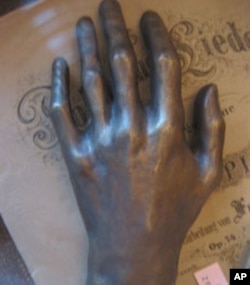March 1 is the 200th anniversary of the birth of Frederic Chopin, the 19th century Polish-born composer whom many consider to be one of the greatest musical geniuses of ll time.
Month-long celebrations of Chopin and his piano music are planned in Warsaw and around the world, including in New York.
Concert pianist Kimball Gallagher, 29, says he first fell in love with Chopin's, "Revolutionary Etude", as a 12 year old and practiced it at his family's piano every day for over a year. That inspired a lifelong love of the composer, a passion he's now sharing with many others as associate producer for "Chopin 200", a free, five-day event in New York's Winter Garden.
Inside the giant marble mall in the World Financial Center, more than 150 pianists are scheduled to play 200 hours of Chopin on four pianos.
"I'm very excited about it," says Gallagher. But the musical feast isn't just for Chopin-connoisseurs. It's also intended for anyone who's unacquainted with Chopin's extraordinary body of work.
"We certainly hope there'll be a lot of people who'll be surprised when they are walking through and say 'What is that?' and they are going to come and sit down and be intrigued, and then realize that even though he was born 200 years ago he's still very much alive," says Gallagher.
Born in Poland in 1810 to cultured middle-class parents, Chopin was recognized early on as a musical prodigy. He was influenced by the aristocratic families who hosted him and nurtured his development as a composer and musician.
"Grand" and "intimate" are words often used to describe Chopin's music. Its refinement, complexity, simplicity and wide emotional range made the music innovative in its time and it continues to seem modern even today.
Chopin's appeal is truly universal, says Veda Kaplinsky, head of the piano department at the famed Juilliard School of Music, where Chopin is a staple in auditions, classrooms and performances.
"He is one of those very rare composers that was able to combine an incredible, almost unfathomable emotional depth and intensity with an organic understanding of the keyboard that makes paying his pieces extremely satisfying for musicians and listeners alike," says Kaplinsky. "His music is extremely accessible in that the melodies are absolutely beautiful and the harmonic treatment is such that he really touches a very inner chord in the listener's heart."
"Take the A minor Sonata, an amazing piece of music which is a microcosm of all of life in two minutes, it's incredible," she says. "There is a one-two rhythm underneath but it's never strict. It's always manipulated, and the way it is manipulated makes you cry, makes you laugh, makes you want to dance, makes you do all kinds of things."
Weakened by tuberculosis during much of his short life, Chopin died at 39. But he brought unmatched vigor and tempestuousness, not only to his music, but also to his love affairs, most notably with the free-thinking novelist George Sand, a woman.
Robert Schumann, a fellow composer and contemporary admirer of Chopin's, once said he heard "cannons hidden amid flowers" in Chopin's piano works.
Veda Kaplinsky often hears it in Chopin's ballades, a musical form she says he both invented and perfected.
"It starts out as a fairy tale, a 'once upon a time' kind of thing and it evolves into something very dramatic and very tragic," she says. "They were modeled after literary pieces and in terms of their musical form, they are based on a theme that keeps recurring and every time it recurs it is more dramatic and more tragic and usually leads to a very tumultuous conclusion."
Some of Chopin's best-known music is associated with personal tragedy, such as the "Funeral March" that forms part of his B Minor Sonata. It was played at his own funeral in Paris in 1849.
Chopin lived most of his adult life in Paris and was the toast of the cultural capital. But he remained a staunch Polish nationalist, angered by the loss of his country's independence following the Napoleonic wars. His "Heroic" Polonaise evokes the color and struggle of military battle, and established nationalist music as a genre.
But it is the dreamy and sensuous "Nocturnes" that most inspire Juilliard's Fei-Fei Dong of Hangzhou China. "My teacher always told me 'when you play this piece, every note means something and you have to love every note,' and I think it's just so beautiful," she says.
"So I think everyone with a sensitive heart can feel Chopin. Chopin's music is full of love. Chopin's music also, it's very simple. That's why people love Chopin also. You can't impose too much artificial things to it. It has to flow out naturally. It's like born out of your body."















